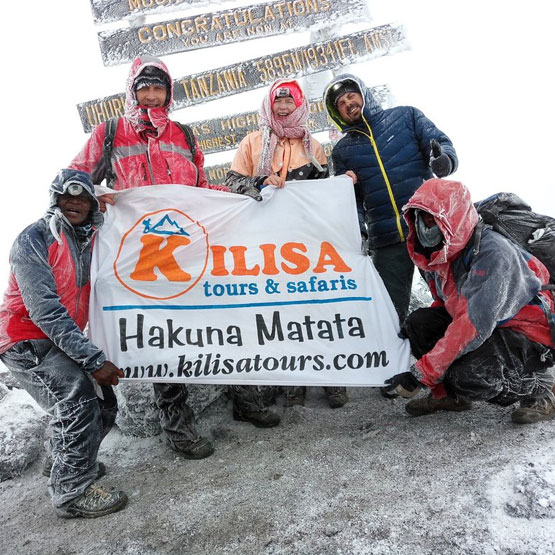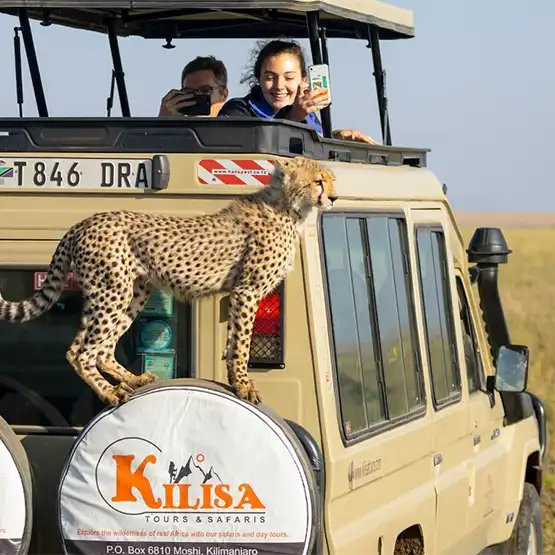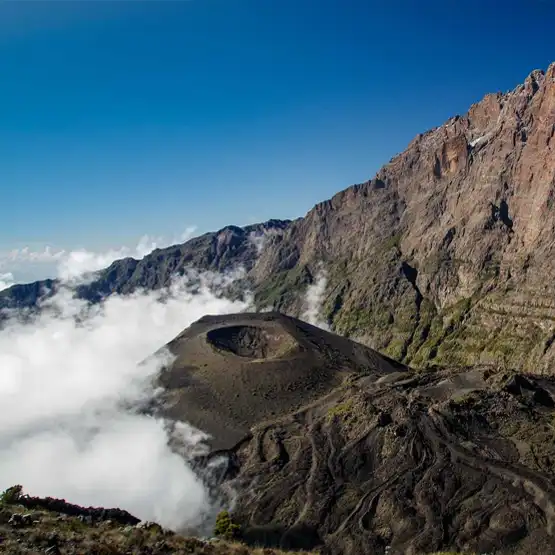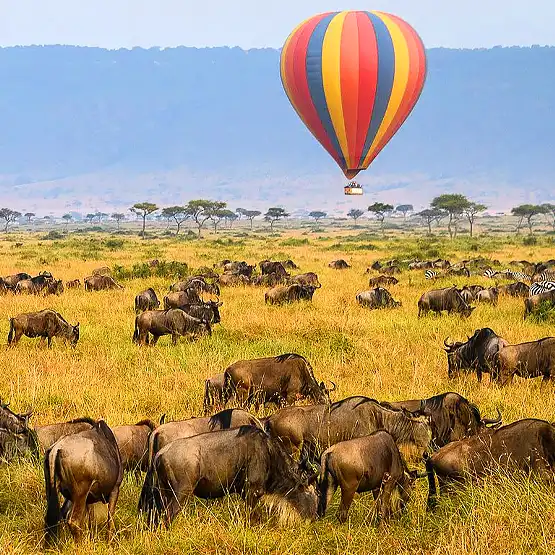Traveling across the wild plains of Tanzania on safari is a dream many hold dear. However, many are unaware of the actual costs involved in such an adventure. With 2024/2025 on the horizon, knowing the potential investment for this trip can be vital for planning.
The cost for a Tanzania safari varies greatly depending on several factors including the season, accommodation type, and length of the safari. Historically, peak season rates can soar, making early booking a strategic move. For example, a 7-day safari in an upscale lodge can average around $5,000 to $7,000 per person, offering a lush blend of luxury and wilderness.
Overview of Safari Costs in Tanzania for 2024/2025
A Tanzania safari’s costs in 2024/2025 can vary widely. Factors such as the type of accommodation, duration, and time of year play significant roles in determining the price. According to this post, the average cost for a mid-range safari is between $250 and $500 per day per person. This estimate includes food, accommodations, transportation, and park fees. However, luxury safaris can exceed $1,000 per day.
One major factor affecting safari costs is the accommodation type. For instance, staying in luxurious lodges will be more expensive than tented camps or budget lodges. Whether you choose a VIP experience or a modest stay greatly influences your total spend. Most safari packages include full board but always check specific inclusions.
The season you choose for your safari also impacts costs. Peak season, typically during the Great Migration, sees higher prices due to increased demand. Low season, on the other hand, offers more affordable rates but with distinct weather conditions. Here is the article detailing seasonal pricing differences.
Additional costs to consider include international flights, visas, travel insurance, and tips for guides. These extras can add a noticeable amount to your budget. According to the article, planning and booking early can yield better deals and savings. Crafting a well-thought-out budget will ensure an enjoyable and stress-free safari adventure.
Key Factors Influencing Safari Expenses
Several factors play a crucial role in determining the costs of a Tanzania safari. The choice of accommodation, ranging from luxurious lodges to budget camps, significantly impacts the overall expense. High-end lodges offer unparalleled comfort but come at a premium. Conversely, budget camps provide a more rustic experience that can be quite affordable.
Duration is another vital factor affecting safari expenses. The longer your safari, the higher the cost. Some safari packages offer discounts for extended stays, which can be beneficial. It’s important to balance the length of the trip with your budget to get the most out of your experience.
Time of year also dramatically influences prices. High season, especially during the Great Migration, attracts higher costs due to demand. Low season might be less expensive but could have varied weather conditions. Here is the article that explains seasonal cost variations and the best times to book.
Additional expenses include park fees, transportation, meals, and tips for guides. These extras can accumulate quickly. It’s wise to research what is included in your safari package to avoid unexpected costs. According to the article, being aware of these factors helps in better planning and budgeting your trip efficiently.
Accommodation Types and Their Impact on Safari Budgets
Choosing the right accommodation type is crucial for your safari budget. Luxury lodges offer exquisite comfort and amenities but come with a hefty price tag. They provide an enhanced experience with top-notch services. On the other hand, budget lodges or tented camps offer a more economical option while still providing a memorable safari experience.
Tented camps are often a favorite for those seeking an authentic adventure. These camps are significantly less expensive than luxury lodges. They allow you to stay closer to nature, often in strategic locations for game viewing. For travelers prioritizing cost, tented camps can be an ideal choice.
Another affordable option is staying at mid-range lodges. These lodges balance cost and comfort, providing necessary amenities without breaking the bank. Mid-range lodges have gained popularity for offering decent value. Balancing luxury and budget can yield a satisfying experience without significant financial strain.
Booking early can also impact the overall cost. Many accommodations offer lower rates for early reservations. Additionally, some packages include full board, which covers meals and offers significant savings. Utilizing these strategies can optimize your safari budget and enhance your experience.
Seasonal Variations in Safari Pricing
Seasonal variations greatly impact the cost of safaris in Tanzania. The peak season, typically from June to October, sees higher prices due to the Great Migration. During this period, the influx of tourists drives up demand and costs. Luxury lodges and camps are often fully booked months in advance. Early reservations are necessary to secure the best experiences.
Visiting during the low season, usually from November to May, can yield significant savings. This period is less crowded, and the rates for accommodations drop. Although the weather can be unpredictable with more rain, the flora is lush and animals are more dispersed. It offers a different, yet equally captivating view of Tanzania’s wildlife.
- Peak Season (June to October): Higher prices, high demand, full bookings.
- Shoulder Season (April to May, November): Moderate prices, varied weather, fewer tourists.
- Low Season (November to March): Lower prices, unpredictable weather, lush landscapes.
Shoulder seasons, like April to May and November, present a balanced option. Prices are moderate, and the weather, although rainy at times, is manageable. Some tour operators offer discounts and deals during these periods. It’s an excellent time to experience a safari without the peak season drawbacks.
The type of wildlife you can see also varies by season. For example, the Great Migration in the peak season presents stunning scenes of wildebeest and other animals. According to this article, planning your safari according to seasonal changes can optimize your experience and budget. Being aware of these variations ensures a well-rounded and cost-effective safari.
Additional Costs to Consider When Planning Your Safari
Planning a safari involves looking beyond just accommodation and park fees. One of the significant additional costs is transportation. Flights to Tanzania and internal flights between parks can add up. Booking early can help secure better rates. It’s crucial to factor in these travel costs to avoid budget surprises.
Visas and travel insurance are other essential expenses. All travelers need a visa to enter Tanzania, which has a fee. Travel insurance protects against unforeseen events like medical emergencies. Without insurance, unexpected costs can drain your safari budget. Always ensure you’re covered adequately before setting out.
Tips for guides and staff should also be considered. It’s customary to tip safari guides, drivers, and lodge staff. These tips show appreciation for their service. The amount varies but can be a considerable part of your expenses. Research the standard tipping amounts for your safari destination.
Meals and drinks can influence the total cost of your safari. While many packages are all-inclusive, some lodges charge separately for drinks. Checking what’s included in your accommodation can prevent additional expenses. Planning for these minor yet essential costs ensures a smoother experience.
Miscellaneous costs include park entry fees and activities. Some parks have higher entry fees than others. Additional activities like balloon safaris or cultural visits can also increase your budget. According to this source, knowing these extra fees in advance helps in precise budgeting.
Cost-Saving Tips for Booking a Safari with Kilisa Tours
Booking a safari with Kilisa Tours can be more affordable with some strategic planning. One of the simplest ways to save is to book early. Early bookings often come with discounts. Planning ahead can secure lower rates for flights and accommodations. It’s a smart move that ensures better deals.
Traveling during the low season is another effective way to cut costs. The low season offers reduced prices for both flights and accommodations. Although the weather might be less predictable, the savings are substantial. Kilisa Tours provides excellent packages throughout the year. Low season travel maintains the charm without the high price.
Group bookings offer attractive discounts. Traveling with friends or family can distribute the costs. Kilisa Tours often has offers for groups which provide better rates. This method not only makes it cheaper but also more enjoyable. Sharing the experience adds to the adventure.
Avoiding unnecessary extras can also keep your budget in check. Decide which activities are most important to you. Take advantage of Kilisa Tours’ inclusive packages that cover major expenses. Skipping extravagant extras helps keep costs manageable. Focus on the essentials for a well-rounded safari.
Comparing different safari packages is advisable. Kilisa Tours offers various packages catering to different budgets. Looking at multiple options helps find the best value. According to this article, choosing the right package can significantly save money. It’s about finding the balance between cost and experience.
Using loyalty rewards or frequent flyer miles can aid in savings. Use these points for booking flights to Tanzania. Kilisa Tours has flexibility in booking arrangements. Combining loyalty rewards with Kilisa’s offers ensures a cost-effective trip. Maximizing these benefits makes your safari more affordable.





